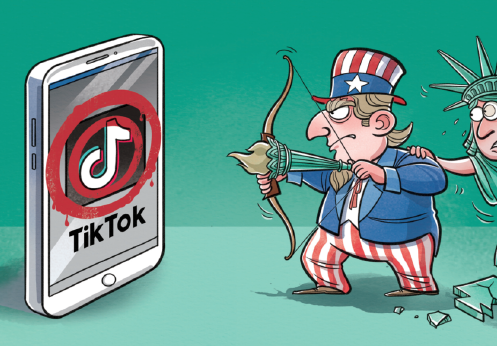
[Photo by Song Chen/China Daily]
By Vox South
Recent news about Tesla and TikTok has puzzled many. In China, there came an official announcement that Tesla models produced by its Shanghai Gigafactory have met China's data security requirements, a green light for Tesla's new products to the Chinese market. The company's stock surged, with a 15.31% jump on the first trading day, adding US$82.6 billion to its market capitalization. Whereas in the US, amidst public opposition, a bill was signed into law that forces TikTok's Chinese parent company either to sell the app's US operations or face a ban, over alleged data security concerns.
When it comes to information and data security, Tesla and TikTok, the two global tech giants, facing completely different fates in China and the US. The contrast raises the question: Who truly champions fair competition and an open market? Who is against protectionism and technological barriers? Who is leading the way in addressing the challenges posed by new technologies? And what actions should other countries take?
Humanity has faced similar dilemmas and choices time and again throughout the history of technological advancement. Every technological breakthrough, be it papermaking, gunpowder, atomic energy, nuclear power, computers or the internet, have brought tremendous progress as well as unprecedented challenges. Fortunately, each time, mankind has made the right choice: to cooperate with an open mind while fending off risks at the same time. This has enabled humanity to always move forward along the right path. Major countries play a crucial role in this process. They are usually the ones who first make technological breakthroughs and discover the benefits and risks of new technologies. In this sense, they bear the responsibility of making the right choice to strike a balance between their own national interests and the common interests of humanity, and to choose openness and cooperation over isolation and monopoly. China and the US have both been the leading players in technology at different historical stages. And they have both made the right choices for the sake of humanity's security and progress.
Today, we are once again at a crucial juncture in the new round of technological innovation. This wave of technological breakthroughs has brought about unprecedented convenience and transformation to our ways of production and life, accompanied by potentially destructive risks. Now both China and the US are world leaders in technological advancement, each excelling in different areas. The world is closely watching their attitudes and decisions which bear on not just the competition between the two, but also the interests of all countries.
The contrasting fates of Tesla in China and TikTok in the US highlight this underlying logic: The way the two countries treat each other's high-tech companies reveals their views of new technologies and associated risks. Embracing openness and cooperation will allow countries to share the benefits and conveniences of technological advancements. Resorting to isolation and monopoly, on the other hand, means countries will be forced to pick sides and accept technological monopolies and ensuing monopolies on markets and prices. That's why many countries resent protectionism and monopoly of the US under the pretext of security concerns but welcome China's approach to open cooperation and sensible actions to balance security and development.
The international community calls on the US to act for the common interests of humanity, shoulder its responsibilities as a major country, and engage in rational dialogue and consultations with China. The ultimate goal is to make the right decisions about using technologies while controlling possible risks.
Vox South, a Beijing-based international affairs commentator.

 中文
中文



